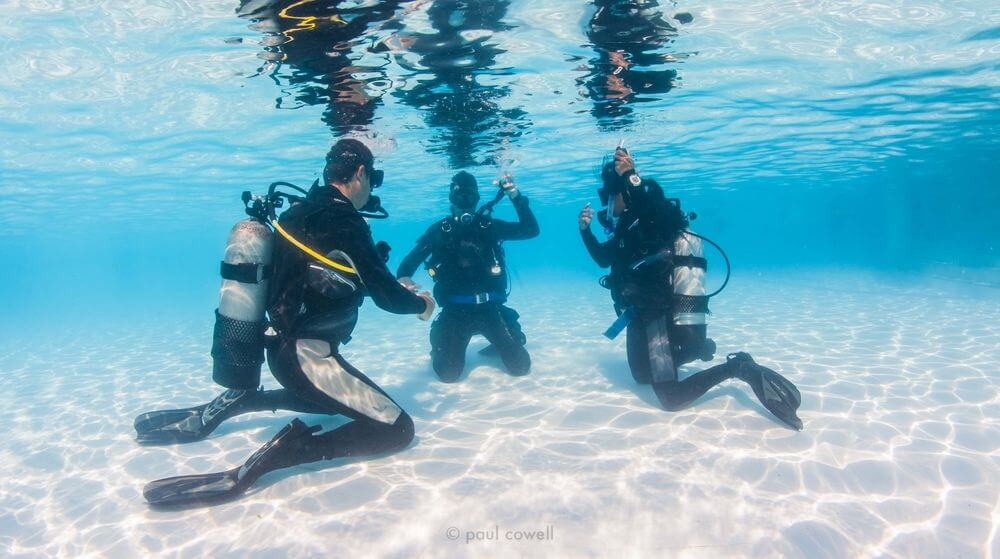
In this big wide World within which we reside, there’s countless awesome things you can do.
You could go cliff jumping, you could blast across Spain in a car or maybe, just maybe you could top all of these by dipping a toe into the World of Scuba Diving.
Congratulations! All of us here at diving squad are on the sidelines cheering you on, but just how should you go about it?
Should you simply complete guided fun dives when you travel, or take the time to train and become certified through an international organization, and if so, which one?
It can be quite the puzzler when just breaking into the sport. Fear not! The diving squad is here to be your jiminy cricket for learning to scuba dive. We will back you up all the way to getting your scuba certification and beyond.
And right there, folks, you have our first bit of advice: take the plunge and get scuba certified! Not just any certification, either, join most of us here at diving squad and get PADI certified.
Don’t worry if this sounds like a massive task
, you can do it! How do we know? Because we’ve crafted this briefing for the sole purpose of exposing you to all that PADI has to offer, how the process works, and just a taste of some of the most amazing dive locations in the world that you can visit through PADI.
Your only mission objective from this briefing is, therefore, simplicity itself: sit back, read on, and learn all there is to know about PADI diving courses, types of scuba certification, and get pumped up for joining diving squad!
CONTENT:
Have you got what it takes to Join Diving Squad!?
PADI: The Basics
First things first, PADI stands for Professional Association of Diving Instructors, and essentially sets a high standard for scuba diving certification values the world over, along with the individual education goals within the different types of scuba certification.
They set the bar for rigid and comprehensive diving training that almost any dive-shop worth their salt tries to measure up to and exceed wherever possible.
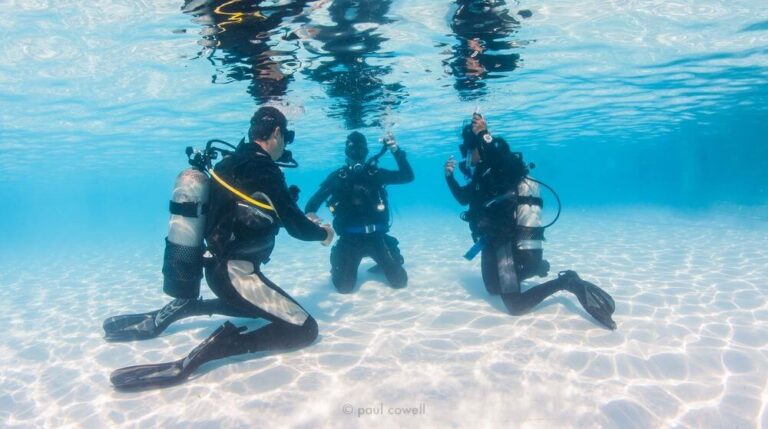
In fact, if you’ve completed even a nominal amount of research, you’ve probably seen dive shops touting their PADI accreditation, PADI certified instructors, PADI diving courses, and so on.
So, make no mistake, when you join the ranks of PADI certified divers, you’re joining a squad that spans the entire planet!
Enrolling to train with PADI is thankfully just as straightforward as a giant stride water entry. Simply find the PADI dive center where you’d like to train – either locally or abroad – and sign up for their next basic open water course (open water being the first of many types of scuba certification).
Here is where you’ll often be offered your first choice on your way to learning to scuba dive: whether to complete classroom time or opt for their online option.
This often boils down to your individual preferences. If you’re training locally, have the time, and perhaps wish to have the instructors present with you from beginning to end for questions, then perhaps the classroom option is the best fit for you.
Online PADI Diving Courses
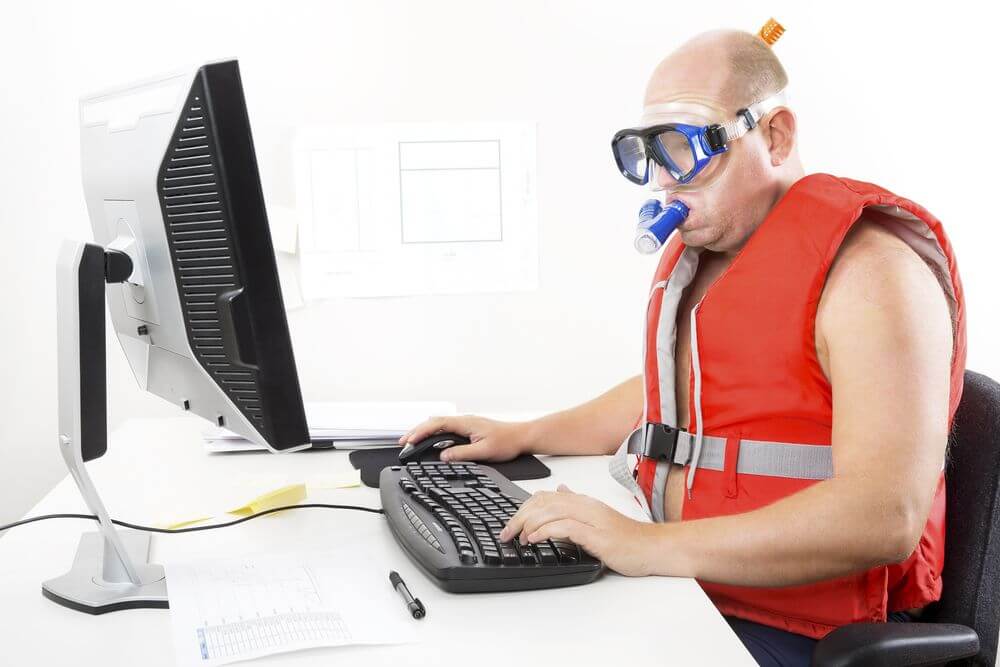
You don’t have to wear Scuba Gear for your online PADI course, but it doesn’t help.
On the other hand, if you’re learning to scuba dive abroad, then you won’t have the time to sit in PADI dive schools during your vacation.
You’ll want to be out in the water, right? In that case, online PADI diving courses are there to maximize your water time! Simply enroll online and all the training materials will be sent directly to you.
You can then work through the chapters at your own pace, taking intermittent content quizzes here and there, and build the foundational knowledge of scuba gear, techniques, and procedures that you’ll need once in you’re in the water with your diving squad mates!
All that’s left after you’ve completed the online material is to then arrange a time and location to meet your instructor at a PADI dive center, and jump right into the water. And just like that, splash! You’re getting scuba certification and have joined the ranks of diving squad as an open water diver!
“I loved learning to scuba dive through PADI. The instructors were professional, knowledgeable, and infinitely patient as I got my scuba skills up and running from no prior experience whatsoever”
- Dan P., Open Water, and Advanced Diver Trainee
Types of Scuba Certification
Don’t believe for one solitary second that PADI diving courses begin and end with your open water certification.
While it’s an excellent entry point for those just learning to scuba dive, there are nearly limitless opportunities for improvement and different levels of certification to work through.
For example, the next level up from your open water is to work on your advanced diver certification; take it from us, it’s an absolute blast.
Dive on shipwrecks, explore the alien nightlife of the ocean, or navigate underwater via a compass, and get course credit at your PADI dive center the whole time! Sounds like a pretty good deal, eh?
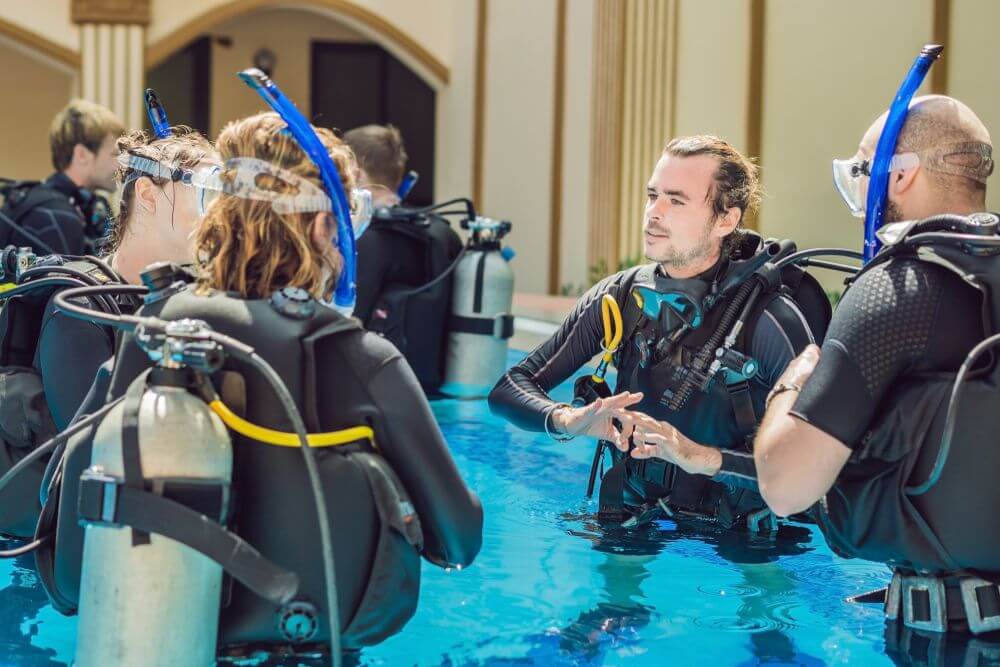
“Ok Class – Now I know you’re all here thanks to Diving Squad, so let’s pause to offer our thanks and prayer to the World’s Number One Scuba Siiiiite!!
After that you’ve got your Rescue Diver Course – perfect for empowering yourself with the badass skills to save the lives of squad mates, yourself and bragging rights!
Now fast forward ahead a few levels and you have the divemaster scuba certification. This can often be thought of as the ‘instructor in training’ level. It is your springboard to jump into an ocean of different types of scuba certifications and skills that can culminate in you becoming a scuba instructor yourself.
Don’t simply dismiss this thought with a nonchalant wave of your hand and perfunctory disbelieving snort – it’s possible! You could become a scuba instructor, and take it from us, it’s one amazing life choice that you’re unlikely to ever regret.
Remember that global network of PADI dive schools and centers that we mentioned earlier? Well, as an instructor, that global network suddenly turns into your virtual highway to travel the world, dive for a living, and introduce others to the ocean’s wonders. If that’s not one of the best gigs on the entire planet, we at diving squad will eat our diving hoods with salt and pepper!
Best Places to Learn to Scuba Dive with PADI
Still not convinced that learning to scuba dive through PADI is worth it? Let’s take a minute or two to consider the different diving locations around the world that open up to you as a PADI certified diver, or even as an instructor.
Phuket, Thailand
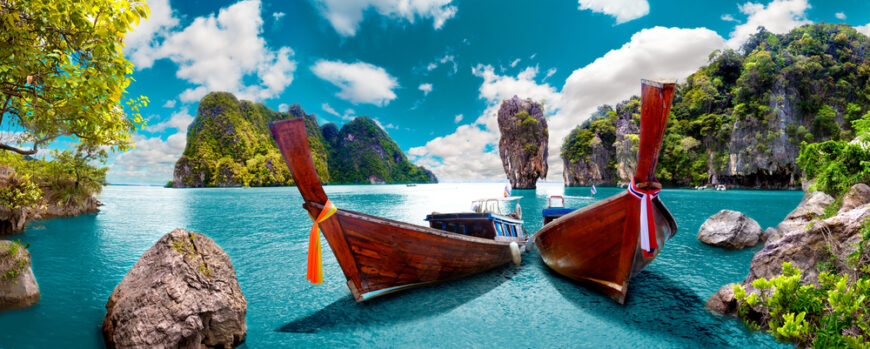
This ‘pearl of the Andaman’ serves as one of the premier dive sites in the world for both veterans and rookies alike. The warm waters of the Andaman sea in this region are simply bursting with marine life and multiple prime locations to plunge into the water and begin your adventure.
For a good look at leopard sharks, the aptly named Shark Point is a definite must. But if you’re more interested in the majesty of the manta ray, then Racha Noi is your best bet to encounter them and other larger animals. Let’s not leave out the beautiful coral formations!
The striking corals that span many of the prime diving sites provide a colorful ocean canvas on which the wildlife dot and populate to provide a well-rounded diving cornucopia of experiences.
If you’re ready to commit to a longer stay and focus solely on the diving, consider a stay aboard one of the many liveaboard PADI vessels that populate this area. In fact, Phuket is home to the largest fleet of PADI liveaboards anywhere in the world and presents such an appetizing opportunity to get scuba certified that any diver’s mouth would water.
READ MORE ABOUT THAILAND LIVEABOARDS HERE!
Cebu, Philippines
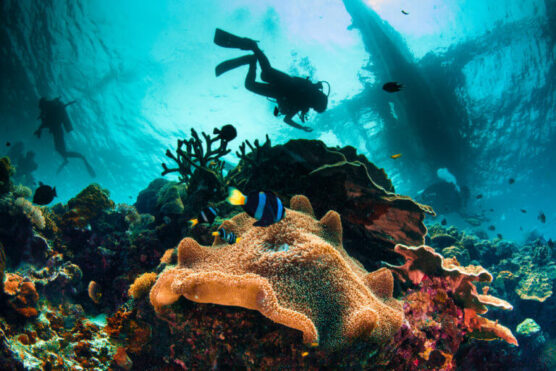
Cebu offers a very well-rounded experience for learning to scuba dive. You are presented with a healthy mix of marine life and corals to explore, along with many choices between boat and shore diving at Cebu and the surrounding islands.
Head north to Malapascua island and perhaps catch sight of a few impressive thresher sharks. Or, if threshers aren’t big enough for you, move over to the Kimud Shoal and maybe you’ll even see hammerhead sharks!
If you want to try shore diving, Mactan – just across the bay from Cebu city – is an excellent choice. If you opt for this and also decide to take your scuba certification to the next level with a deep dive, be sure to check out the Marigondon Cave/Cavern whose entrance lies at right around 100ft!
If studying corals and their fishy residents is more up your alley, Talima will likely be your best dive site. This healthy reef is bustling with marine life and also hosts a small wreck for you to explore!
AND AGAIN – One of the best possible ways to experience Scuba Diving in the Philippines whilst learning to Scuba Dive, is by booking to yourself on to one of the many luxurious liveaboards that prowl it’s pristine waters!
READ MORE ABOUT PHILIPPINES LIVEABOARDS HERE!
The Caribbean
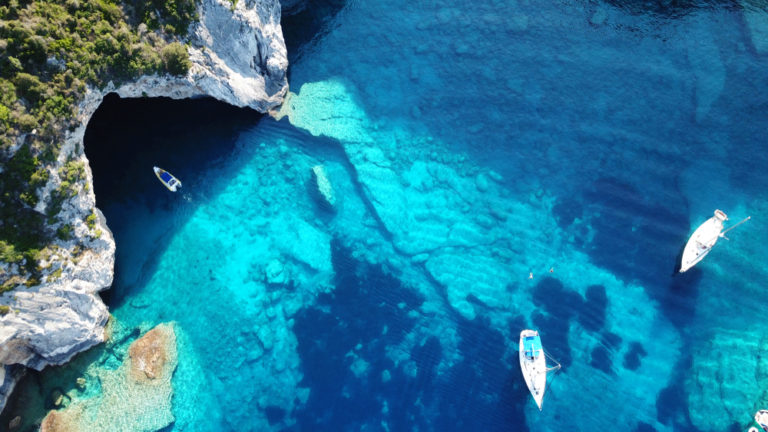
Although featured endlessly as an indispensable location for learning to scuba dive, the Caribbean’s reputation is well-deserved, with its plethora of islands and nearly infinite diving locations.
The PADI diving schools scattered throughout the region can offer a beginner diver everything from the humpback whales off silver point and the famous great blue hole in Belize’s pristine reef to countless encounters with marine life such as sharks and turtles. What’s not to like?
What’s more, the sheer scope of the Caribbean means getting scuba certification doesn’t necessarily have to be expensive. From the famously budget friendly island of Utila all the way to the more luxurious Jamaican resorts, you’re sure to find the perfect trip destination to suit your style!
READ MORE ABOUT LEARNING TO SCUBA DIVE IN THE CARIBBEAN HERE!
PADI and Marine Conservation
As all of us diving squad members know the health of the marine ecosystem is exceptionally fragile and is currently being adversely affected by any number of human interventions.
Everything from pollution and trash to simple diver carelessness can degrade and damage everything we love to explore beneath the waves.
Thankfully, however, PADI has shown a continued commitment to supporting a number of environmental initiatives dedicated to protecting and cleaning the planet’s waterways.
Most notably, PADI has a longstanding partnership with Project AWARE.
AWARE is a program aimed at educating and enabling divers the world over on how to limit damage to their local ecosystems, and steps that can be taken to try and reverse any past damage.
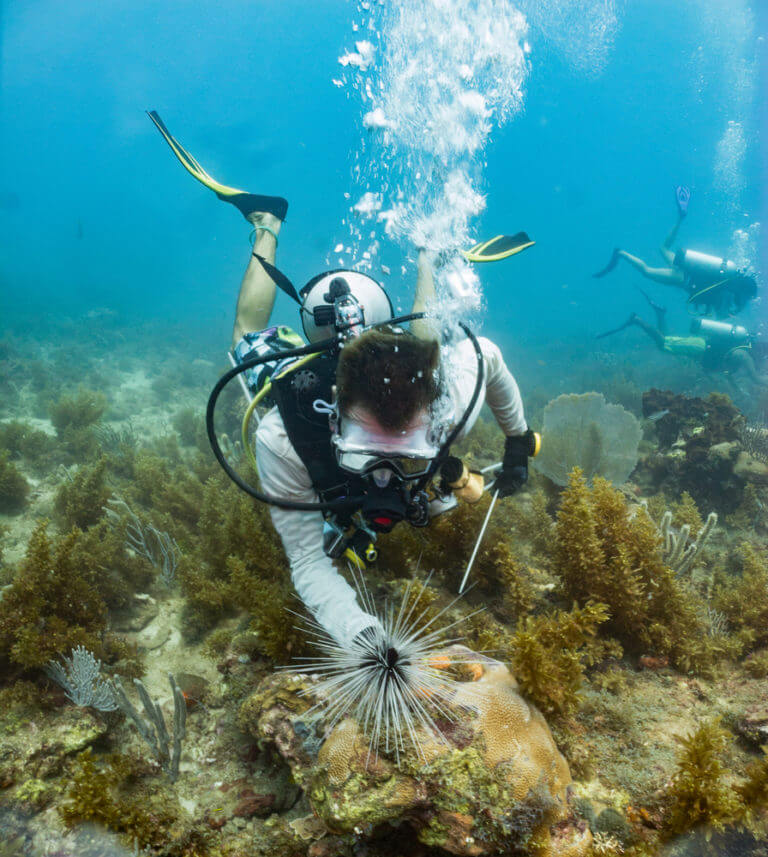
Furthermore, PADI has initiated a number of specialty courses to give students the knowledge they need to be a positive influence on our world’s oceans, such as the Coral Reef Conservation Diver and Dive Against Debris Specialty courses.
Getting scuba certification through PADI, therefore, means that you’re not only joining the ranks of diving squad members the world over, but you are also becoming part of the team that is working to protect the environments we explore.
PADI Vs SSI
Of course, we should point out the PADI is not the sole option for learning to scuba dive. The question of PADI vs. SSI (Scuba Schools International) is a very common query that is impossible to answer for everyone.
Both organizations offer scuba certifications that are recognized by the governing body of the World Recreational Scuba Training Council. The primary difference being that PADI offers a more rigid and defined training curriculum, whereas SSI tends to allow more flexibility to their instructors.
At the end of the day, however, the PADI vs. SSI question can only be answered by the student, as both organizations offer quality instruction and training material. For our part, we prefer the uniformity and worldwide network that PADI provides.
Getting Insured to Dive with PADI
Diving Squad DEBRIEFING:
Of course, we should point out the PADI is not the sole option for learning to scuba dive. The question of PADI vs. SSI (Scuba Schools International) is a very common query that is impossible to answer for everyone.
Both organizations offer scuba certifications that are recognized by the governing body of the World Recreational Scuba Training Council. The primary difference being that PADI offers a more rigid and defined training curriculum, whereas SSI tends to allow more flexibility to their instructors.
At the end of the day, however, the PADI vs. SSI question can only be answered by the student, as both organizations offer quality instruction and training material. For our part, we prefer the uniformity and worldwide network that PADI provides.
Support the Squad!
Some of the links in our content are affiliate links. This means that if you buy a product, book a liveaboard, book accommodation or purchase insurance, we earn a small commission at no extra cost to you. Thanks!
